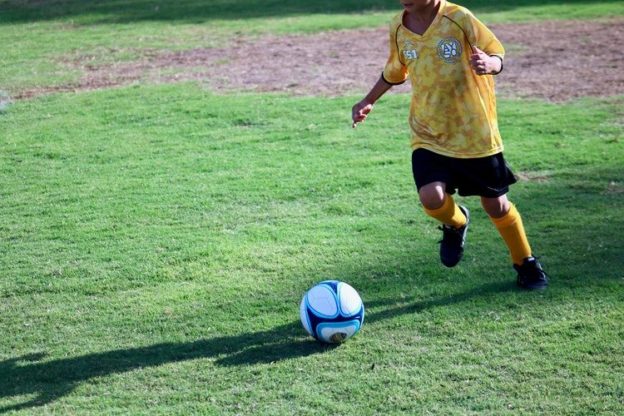It seems, at a certain age, every child wants to try out for a team sport. It could be their friends are doing it, or they have an older sibling that did it before them. Whatever the case, there’s a very good chance that your child may at one point decide to join a school sports team.
Just like every extracurricular activity, joining a sports team comes with pros and cons, but in general they establish positive habits. Your child will learn to cooperate with others toward achieving a common goal, how to lose gracefully, and how to stick with something until they find success. However, they may also learn how much it hurts to break an arm or bruise a rib, in which case you’ll have to ensure they’re being as protected and safe as they can be while playing.
It’s important to know the best ways to prepare your child physically and mentally for a sports team, whether that’s soccer, basketball or even track and field. By talking regularly with your child and staying active in their sports-related events, you can make sure they have all the support they need. Here are a few things to consider as your child engages with a brand new after-school sport:
Staying Active Is Crucial for Your Child’s Health
Children in the United States are currently facing an obesity epidemic. They are already spending 8 hours a day sitting down at school, so once the bell rings, it’s crucial they find ways to stay active in the afternoons and weekends. An after-school sport can be a great way for them to keep busy and get exercise while you finish your shift at work.
Frequently, a part of joining a sports team means doing team workouts together. If your child joins a soccer team, for example, they may do running drills and various calisthenics to be able to stay in the shape the sport requires. Their coach may also talk with them about healthy foods that help fuel their body so they can perform to the best of their ability on the field.
Between understanding nutrition and engaging in regular social fitness, team sports can help give your child a foundation for their future health. They can begin to understand how exercise and diet directly impacts their body and the rest of their health. This is crucial knowledge they can take with them for the rest of their life.
Good Equipment Can Save Lives
Some sports pose a greater threat of risk than others — like football. This isn’t to say you shouldn’t let your child play football, but if they’re going to join the school team, you should ensure they have the necessary protective gear. Parents should especially place emphasis on protective headgear.
Contact sports have a higher risk of head injury, which can cause lifelong problems in some cases. For example, football has been in the news as more and more is discovered around chronic traumatic encephalopathy. This is a degenerative disease triggered by traumatic brain injuries, and it’s one found frequently in former NFL players.
By investing in good protective gear for your child when they join a sports team, you’re allowing them to play the sport they love while protecting them for the future. If you’re a chronic worrier, you can always talk with your child about ways to make sure they’re protecting their body on the field. It may also benefit everyone to check in regularly with the family doctor to ensure everything is being protected the way it needs to be. Moms can also bring a bag of sports-related essentials, in case anyone forgets anything at home.
Sports Can Bring Families Together
If you have a multi-child family, then one child’s sporting events can be something the entire family enjoys together. It can be a bonding activity to watch games and cheer on your child together — you can even make matching T-shirts! Your child will feel encouraged, and your family will enjoy the day together watching a fun soccer or basketball game.
Additionally, seeing one sibling enjoying a team sport may inspire others to follow suit. Maybe they all want to play soccer together because the oldest child loves it, or maybe they want to strike out into a new sport on their own like baseball or hockey. Regardless, if your children love sports together, they will have a healthy activity that bonds them for life — something they can tell stories and learn from one another about.
Finally, you may want to see if you can find a sport that your family can all play together. Maybe on the weekends you could all learn tennis and practice on the high school courts, or you could all play soccer in the backyard. It can be a beautiful way to learn and grow with your family while getting in some regular healthy activity — even if your backhand serve could use a little love.








